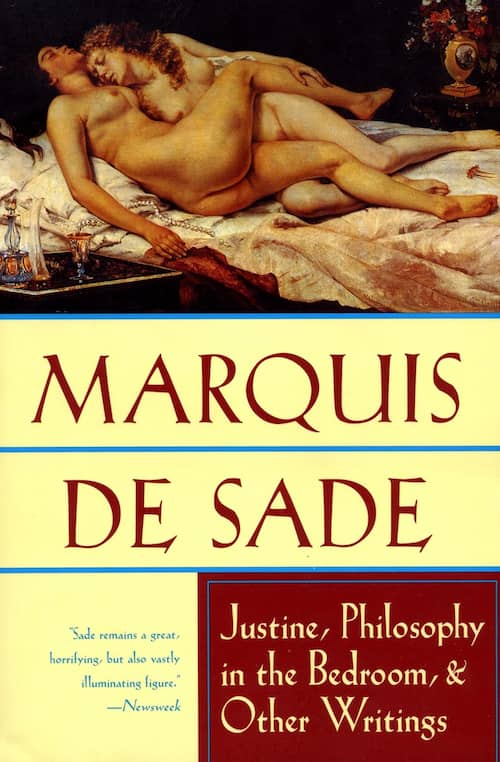Thank you, Ada Palmer. I had my suspicions about Sade, that more was going on than just some shock and awe erotica, and in Too Like The Lightning, when he becomes part of the dialogue in a key way, she makes it clear that to read Sade as sadism is too narrow a view. I had to go to the source to confirm it, and confirm it I have.
“I am about to put forward some major ideas; they will be heard and pondered. If not all of them please, surely a few will; in some sort, then, I shall have contributed to the progress of our age, and shall be content.” (from “Yet Another Effort, Frenchmen, If You Would Become Republicans”)
Sade wants you to think. It’s all to a point—one that kept him imprisoned for much of his life. He’s in dialogue with his peers. He’s parodying 18th century scientific logic. He’s invoking taboo because, as Palmer would put it, that’s the Enlightenment art: mixing forbidden sex acts with forbidden things, especially forbidden talk.
Context is everything. And Sade, within context, isn’t a beast who’s willing to file down his teeth. His pornography is ideas—scathing, provoking, often remarkably funny, terribly, boldly uncensored ideas. About God. Philosophy. Crime and punishment. Sexuality. Morality. On and on. There isn’t an extreme he won’t push. I get the feeling he gleefully contradicts himself, intentionally, again, just to get readers to think. Don’t take it all as read, even what he’s saying. Think you get his point? Wrong again, think some more.
He’s a piece of a larger puzzle, and I would argue a crucial one. All these centuries later, he has refused to die, and it’s worth listening to what he has to say, if only to see where we might still be blind.
Sade warns that he who would use Reason as a key to open one door opens many, and he who would make Reason a scythe to fell injustices must beware what else the blade might cut. (Too Like the Lightning)
Pull quotes ⚭
Voltaire’s version of man may explain how humankind came to invent the spade; Jean-Jacques’, the hayloft; Diderot’s, conversation. But ogres and inquisitions and wars?
“Eh,” replies Voltaire, “those poor people were mad. We shall correct all that.”
“That is exactly what I call cheating,” rejoins Sade; “we set out to understand man, and before we have even begun you are already trying to change him.”
“My neighbors’ passions frighten me infinitely less than do the law’s injustices, for my neighbors’ passions are contained by mine, whilst nothing constrains, nothing checks the injustices of the law.”
In a sense, this was one of Sade’s ambitions: to be innocent by dint of culpability; to smash what is normal, once and for all, and smash the laws by which he could have been judged.
“But, unfortunately, I was in the clutches of a flock of imbeciles who always use fetters for arguments and bigotry instead of philosophy, and that for the great good reason that it is always much easier to impound than to ponder and to pray to God than to be useful to mankind. In the one case some virtues are required; only hypocrisy is required in the other.”
“It is not to them I speak; I address myself only to people capable of hearing me out, and they will read me without any danger.” (this makes me think of Jane Austen’s dull elves)
“We wonder that savagery could ever reach the point where you condemn to death an unhappy person all of whose crime amounts to not sharing your tastes.”
“A little more philosophy in the world would soon restore all to order and would cause magistrates and legislators to see that the crimes they condemn and punish with such rigor sometimes have a far greater degree of utility than those virtues they preach without practicing and without ever rewarding.”
